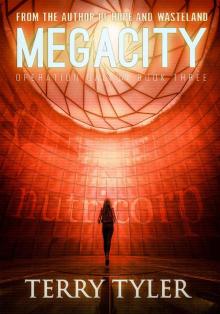- Home
- Terry Tyler
Hope
Hope Read online
HOPE
Terry Tyler
©Terry Tyler 2019
This is a work of fiction. All names, characters, places, websites, computer applications, product names and incidents are either products of the author's imagination (and subject to copyright protection) or used fictitiously.
Any resemblance to actual events, locations or persons, alive or dead, is entirely coincidental.
No part of this publication may be reproduced or transmitted in any form or by any means, electronic, mechanical or otherwise, without the express written permission of Terry Tyler.
All rights reserved.
Dedicated to my beloved mother, Barbara, who instilled in me a love of the written word, and read my first unpublished manuscripts, many years ago.
Contents
Introduction
Prologue
Part One: Guy Morrissey's Britain
1: Lita: Five Years Later
2: Brand Morrissey
3: Blog Life
4: Friends, Family and the American Dream
5: #FitForWork
6: Christmas Hope
7: Butterball Nation
8: Blue Monday
9: The Winter of our Discontent
10: Love In A Cold Climate
11: Reduce
12: Sugar Sugar
13: Brick Walls
14: Fog
15: #FitForLife
16: The Fear
17: The Slide
18: Four Walls and a Roof
19: The Abyss
20: Betrayal
21: Hope
Part Two: The Village
22: Abandon It, All Ye, etc.
23: No Babies
24: Beautiful Sunday
25: No Way Out
26: The Heat of the Night
27: Shadows
28: The Bitterest Pill
29: Whistleblogger
30: Alone
31: Behind Closed Doors
32: Out
Part Three: Off The Grid
33: Jaffa
34: Lake Lodge
35: 21st Century Girl
36: Open The Box
37: The Choices We Make
38: Whistleblower
39: Pandemonium
40: Warrant
41: Brand #MoMo
42: The Lita Stone Effect
43: Michelle and Stephen
Epilogue
Author's Note
Bonus Story 1: First Love
Bonus Story 2: Self-Control
Other Books by Terry Tyler
Introduction
Hope, my fifteenth full-length published novel, is a dystopian story set in the UK, in the not too distant future.
None of us can accurately picture the world we will be living in, ten or twelve years from now; all we can do is read the predictions of those better educated on the subject. Aside from more serious issues, we don't know how social media and cultural trends will develop or how attitudes will change, and neither can we be sure how technology will evolve; who, twenty years ago, could have predicted the world domination of Facebook? This story is simply a product of my imagination; whether any of it will mirror the future, we must wait and see.
At the end of Hope you will find two short stories. First Love takes place during the summer when protagonist Lita was sixteen, while Self-Control is the backstory of a secondary character, Prime Minister's wife Mona Morrissey. Shorter versions were originally part of the novel, but I decided they worked better as separate short stories. You might like to save them until the end, or refer to them at any point during the main story.
Enjoy!
Prologue
The Nutricorp Building, West London.
Memo
Date: 24.11.23
To: Caleb Bettencourt, MD
From: Neil Jensen, Head of PR
Re: Meeting with Ed Baxter, Head of Logistics for Operation Galton Phase II
Caleb,
Based on the stats for the relevant socio-economic groups from the past 10 years, the opinion of Ed and myself is that Phase II should be introduced more gradually than discussed with you last week. We believe a sudden decline may be detected by our friend the conspiracy theorist in the street, and could snowball―
"For Christ's sake."
Caleb Bettencourt turns away from the monitor and presses a button on his comms system.
"Get me Jensen." He waits, drumming his fingers on the top of his desk. "Neil? If I'm on speaker, take me off. Right. Listen. We haven't got time to piss about. Phase II will commence as soon as the first compound is up and running, next year, as planned. Our instructions come from the top: a fifty per cent decline by 2030, rising to eighty per cent in ten years. Going forward, the official stats will say what we want them to say. Your job is to get your arses in gear, and the ball rolling."
"Got it."
"Good. So, while you two were wasting hours of company time chatting about this, did your team settle on a brand name? This has gone on too long, and the PM and Paul hate every one you've proposed. Forget the word 'smart'; it puts the theorists on red alert―"
"We've got it. You're all going to like this one." He pauses. "Hope."
"You hope?"
"No. Hope. That's the name."
Caleb frowns. "As in Hope Community? Hope Compound?"
"No. 'Community' is too artsy, and 'compound' sounds like a prison, which is, of course, contrary to the impression required―"
"Just let me have it."
"Okay." Jensen coughs. "Hope Village."
Caleb Bettencourt shuts his eyes for a moment, and nods. "It's perfect." His face relaxes into a smile. "Hope Village. Makes you think of cosy cottages and sunlit horizons, doesn't it?"
Jensen's joyful relief is silenced, mid-sentence, as Caleb presses a button to end the call.
He opens a file on his desktop.
Operation Galton, Phase II.
The future of the UK, Nutricorp style.
Part One
Guy Morrissey's Britain
1
Lita Stone
Five Years Later
We don't notice our world changing around us, because those little shifts take place so gradually. Attitudes are altered one decision, one blind eye turned, one 'I accept' at a time, until a situation that would have seemed unthinkable ten, twenty, thirty years ago, becomes the norm.
I've been pondering this a lot over the past few days, since I walked past the usual mile-long queue outside our local food bank, and thought, hang on a minute. When did this happen?
When I was a kid, I knew food banks existed but had never seen one. The UK's first opened in 2004; I googled it so you don't have to. Now they're in every town, as normal a feature of our urban landscape as Nu-Mart and BettaBargains, but still they're not government funded. They rely on charities, and people like me who dump a packet of Nu-Mart Pasta 'n' Sauce in the donations basket when we do our weekly shop.
One ponder led to another, and 'why so many food banks?' got me thinking about Hope Villages.
Since the first one, four years ago, they've popped up all over the country.
Sounds cosy, doesn't it? Hope Village. Rosy-cheeked kids and lovingly tended gardens. A smiling vicar walking his dog, and pots of jam with gingham covers over the lids.
The reality is somewhat less appealing. The 'Villages' are estates of warehouse-like structures to house the homeless, with nary a jar of apple and blackberry preserves in sight.
Not so long ago, the less fortunate of our nation―of which there are said to be over two million―were part of the scenery in any town. You'd see them slumped in shop doorways, sitting blank-eyed on park benches, begging outside supermarkets and cafés.
Queueing outside the shelters.
There are t
wo shelters near us: Horizon, and a Roof. Roof Charity has opened many, all over the country, in the past decade. I walk past and try not to stare at the bewildered faces of those who have only recently fallen this far and are trying their best to cling to 'normality', alongside the long-termers, their dead eyes staring at the ground.
The queues outside the shelters used to stretch to the end of the road and round the corner; over half would be turned away to find a warm, dry space for the night wherever they could. Now, though, those lines have shrunk. Over the last four years, most of the homeless have been tidied away into Hope Villages.
There used to be a guy who had a regular spot outside my nearest Nu-Mart Local; I'd nip in and buy him a BLT and a bottle of Lucozade whenever I passed, and stop for a chat. He's gone, now; I was told by a Nu-Mart shelf-stacker that he was picked up by the vagrancy police, under the new Zero Tolerance for Vagrancy law.
Until it's time to queue for a bed in a shelter, you'd better stay invisible, or you'll be sent on your way to Hope.
Cardboard cities have been tidied away into the recycling bin. No more do we see photos of them on social media with captions about the outrage that this country, this affluent satellite of the US, cannot look after its poor.
Something has been done, so we can forget them, and find something else to virtue signal about.
The Villages have been sold to us as the great solution: a safe roof and the first step on the road back to society. Mr and Ms Homeless can retrain. Gain a sense of community, with good nutrition and medical care. Now and again, a Hope success story is splashed all over the news sites:
'I thought my life was over, but Hope retrained me for a career in security―now I'm back in a private rental, and looking forward to a bright future. Thank you, Becky, Duncan and everyone at Hope 15; I couldn't have done it without you!'
Hope began before our jazzy new PM took power, but under Guy Morrissey's loving care, the Villages have been given such a positive spin that I'm surprised half the country isn't selling up to go and live in one.
Mostly, they are situated in the countryside, or in those no man's lands between towns, the green bits that edge the dual carriageways. They are well hidden, behind barriers of trees.
The first was opened in 2024 in Tyne and Wear, i.e. far enough away for nobody south of Birmingham to take much notice.
Footage showed a town's portly mayor shaking hands with Armani-suited Caleb Bettencourt of retail giant Nutricorp, holding between them one of those daft giant cheques showing lots of noughts, a symbol of Nutricorp's pledge to keep the inhabitants of Hope fed, watered and medicated. Behind them stood beaming Beckys and Duncans in yellow or green polo shirts and the odd baseball cap, sporting lanyards announcing themselves as 'Client Key Workers' or 'Educational Motivators'.
Not everyone was convinced. On social media, a few clever pictures of the entrance to Auschwitz were Photoshopped with the Nutricorp logo―a sapling against a shining sun―above those infamous words, Arbeit Macht Frei.
People liked, shared and retweeted, and then forgot, but that was okay, because they'd made their socially aware statement for the day.
Meanwhile, council estates built before the 1970s were being demolished. Hope is cheaper than houses.
Brody, my sometimes-boyfriend, tells me this is the unofficial catchphrase within the Housing Department of the DSC (Department of Social Care), where he works as a Client Liaison Advisor for Hope Villages. Their construction is ongoing, as technological advances destroy jobs, benefits become more difficult to obtain, and thousands cross the line that separates the Just Getting By from the Totally Fucked.
Brody's job requires him to travel around the country advising the Beckys and Duncans how best to help the poor souls in their care, a task with which he becomes increasingly disillusioned. He says his job was one of several created so that the government can pretend that they actually give a shit. He also tells me that the promise of Hope being the first step back towards 'normal' life is a myth. Some large employers pledge to take on a certain amount of Villagers per year, but they're the exception; there are clusters of post-millennials with decent addresses and shiny new IT, social studies and business degrees waiting to fill every vacancy.
The country is alive with Hope. If you see a new road leading off towards clumps of densely packed trees, through which you might just spy a grey-green roof, that'll be a Village. After the first, they were opened with no fanfare, no announcement to the press. They sprang up from flattened earth when we weren't looking.
They're 21st century leper colonies. No one goes near them unless they have to.
I was talking to my friend Nick about it the other day. Nick, I said, do you remember five years ago when there were no Hope Villages?
And he said, "Do you remember when you could go to work without fear of the random piss test?"
Ah. That's another gremlin that nipped in unnoticed when we left the door open.
I'm lucky. At Aduki (it's a health food café), my boss, Esme, is more likely to offer me a glass of wine than demand a sample of my wee, but in most workplaces random testing has become the norm.
It arrived alongside the medical that's now standard procedure once you get to final interview stage for any job. Who will be the lucky candidate? Brilliant Bill, who's a bit on the lardy side and likes to glug Shiraz of an evening, or Mediocre Mike, who doesn't drink, smoke or even vape, has a BMI in the smug white bit of the diagram, and takes regular exercise?
What if the employer takes a punt on Brilliant Bill, but his sneaky weekend snort shows up in a random test? Or if he's simply replaced by a robot, and the new-tech-savvy post-millennials pip him to the post in all future job applications? Why, then he'll need to apply for WRC (Work Ready Credit). Clue's in the name; cue another medical to prove he's doing all he can to ensure that he is fit for work.
Brilliant Bill, you will need to approach the section entitled 'Tell Us About Your Health' with extreme caution.
If you are deemed not 'work ready' because of your unhealthy lifestyle, you lose.
Which may mean you can no longer maintain the roof over your head.
But what if you have no friends or family willing to take you in?
Welcome to Hope Village, Bill.
WRC health assessments are carried out by 'independent' body Valid8, a department of Nu-Pharm. Yes, the pharmaceutical division of Nutricorp.
Irate tweets abounded when Valid8 won this contract. Human rights, discrimination, the usual stuff. But they soon faded away, out-shouted by Mediocre Mikes asking why they should pay taxes so that lazy bastards like Brilliant Bill could loll around watching Netflix all day, glugging Shiraz and stuffing in pizza.
In time, we have got used to this too.
We click 'I accept', because we have no option.
We don't realise how easy it might be to end up like Brilliant Bill.
To walk the road to the leper colony.
2
Brand Morrissey
Six Months Earlier
"We haven't elected a prime minister, we've elected a lifestyle."
Thus spoke Nick, when we watched the victory celebrations on TV. Guy Morrissey stood triumphant upon the stage, waving to his ecstatic supporters, all but overshadowed by his glossy fitness guru wife, Mona (hashtag MoMo).
Kendall instigated a high five with Nick after he made that observation; Nick's gesture was riddled with cynicism, whereas Kendall's was of the 'Yay! Go #MoMo!' variety, except that she's not allowed to say 'yay' in this household. Nick and I told her, early on, that it's on the list of forbidden words; three strikes and she's out, and we'll find someone else to pay her third of the rent.
I asked Nick if I could steal his phrase for a blog post.
"Too late," he said. "A version of it is the title of tomorrow's piece." He got up, stuck his hands in his pockets, and honoured me with a smirk. "Feel free to re-blog."
Nick's a journalist, for Global Online. Like, a day job type of journalist. Po
litical and cultural comment―he served his apprenticeship writing for a local paper when freshly kicked out of college, and used to send odd pieces to Global when he was travelling the world; they were his foot in the door. I bow with respect. My blog's my main source of income, too, but it's just social snark and reviews.
Meanwhile, Guy and MoMo are Prime Minister. I say that without irony; I am sure Mona Morrissey's celebrity was the main contributory factor in her husband's success. Their PR team milked it for all it was worth.
Guy is Man of the UK, complete with carefully constructed bio about his lower-middle class upbringing and ascension through the political ranks. Mona is Ms Manhattan, though she was born in England to an English mother and a half-American father. Daddy is multi-billionaire Paul Bettencourt, who founded Nutricorp and backed his son-in-law's path to success from the moment he was put forward for party leader, and probably years before.
Guy and Mona thank their PR teams, social media coaches and Communications Director openly and with enthusiasm. Behavioural microtargeting via social media is the accepted norm now during electoral campaigns, but older people say that never before has one been staged so ruthlessly.
"They're just so brash," said Esme's eighty-three-year-old mother, when she was in Aduki the other day, enjoying her afternoon cup of tea and low-fat, wholemeal scone with low-sugar jam and a football sized dollop of clotted cream ('yes, I know, but at least I'm getting it half-right'). "They're more like Americans. It's not the way we do it here, is it? Or didn't used to be, anyway."
Indeed, the American Dream has come to the UK. Charming Guy and sizzling Mona, with their sparkling smiles and blonde-streaked hair, lightly-tanned skins from family cycle rides and boating holidays with sixteen-year-old Aubrey, who hosts healthy-eating 'cook-outs' for her American teen show-esque chums, and fourteen-year-old Hunter, who speaks at school about the evils of drugs and drink.

 Megacity: Operation Galton Book 3
Megacity: Operation Galton Book 3 Last Child
Last Child Hope
Hope Dream On
Dream On Tipping Point (Project Renova Book 1)
Tipping Point (Project Renova Book 1) Wasteland
Wasteland Blackthorn
Blackthorn Lindisfarne (Project Renova Book 2)
Lindisfarne (Project Renova Book 2) UK2
UK2